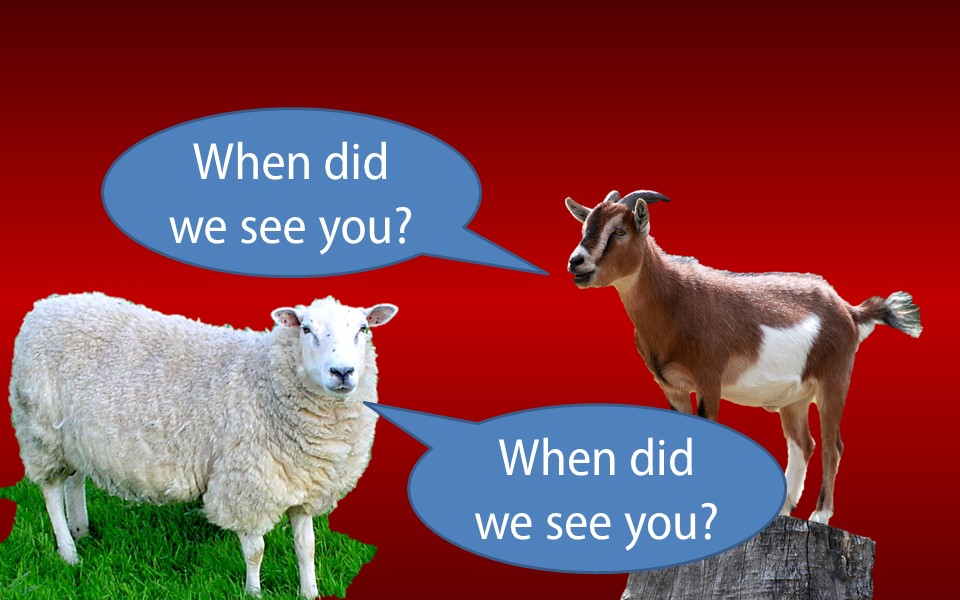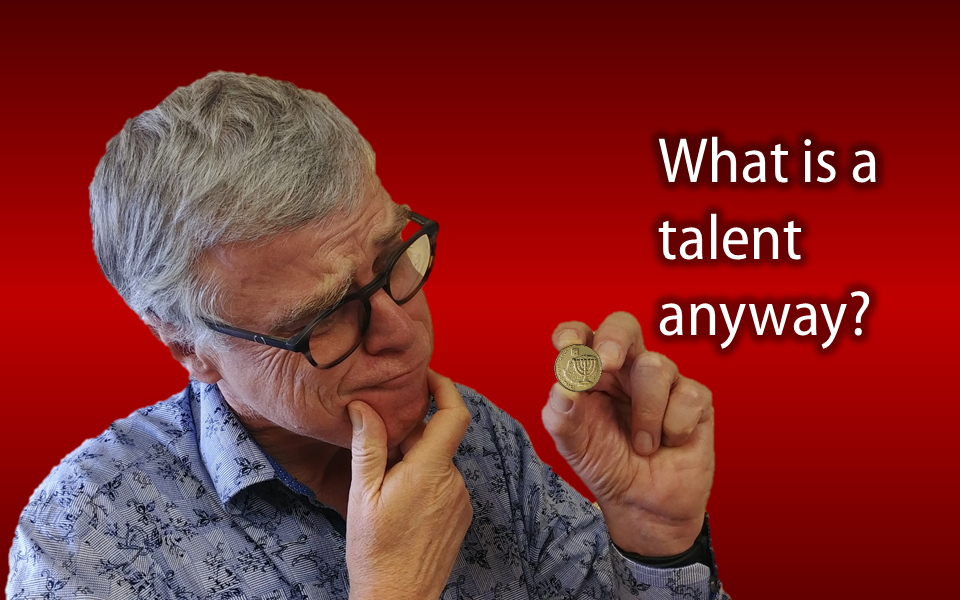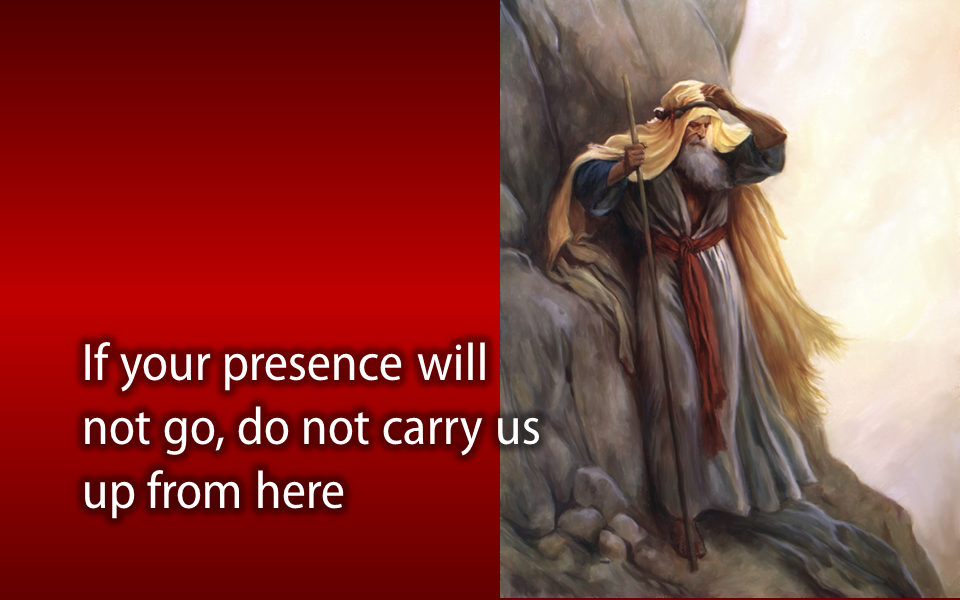Hespeler, 22 November 2020 © Scott McAndless
Ezekiel 34:11-16, 20-24, Psalm 95:1-7a, Ephesians 1:15-23, Matthew 25:31-46
Salvation is by grace through faith. That is perhaps the most central teaching of protestant Christianity. And, in many ways, every sermon I preach, every study I lead is ultimately trying to explain what that teaching really means. The bottom line seems to be this: none of us are going to be able to earn God’s favour by being good enough. God is rather looking for us to place our trust in God and in what God has done for us in Jesus Christ.
And that makes the parable that we read this morning from the Gospel of Matthew a bit of minefield for a good old-fashioned Protestant preacher. I have privately heard Christian preachers and teachers suggest that they really don’t like this parable and that they kind of wish that Jesus never told it because, of course, this parable depicts the final judgment. And when the people are divided and judged as to whether they have pleased God, there seems to be only one criterion that matters: those who have behaved in the right way are blessed and those who have behaved in the wrong way are condemned. It seems to be a textbook example of salvation by works and not by faith.

And, yes, the actions that are celebrated in this parable are all really good. I would absolutely love to see people welcoming strangers, feeding the hungry, clothing the naked and visiting those who need it. And obviously those are precisely the kinds of actions that do please God. But, at the same time, I do not believe that we, as people, can become more pleasing to God by our frequency or quality of such actions. So, what am I to do with this parable? How am I supposed to relate it to some of my central theological convictions?
Let me first say something about the whole notion of salvation. In the minds of modern Christians, we often make an easy connection between the notion of salvation and the whole question of who gets into heaven. For too many Christians, that is all that salvation means, a ticket to heaven someday after we die. But I just feel I need to say that this parable is not actually about who gets into heaven or into the afterlife and who doesn’t. It is a parable about who is already in the kingdom of heaven.
The kingdom of heaven, in the Gospel of Matthew, is very clearly more about a present reality that people can live in right now than it is about what happens to people after they die. The key point is that those who do the things described in the parable are already in the reality of the kingdom of heaven and those who don’t aren’t. That is not to say that the kingdom of heaven does not have a reality or fulfilment beyond this present world. And I do believe that, in this world, we are meant to prepare for that ultimate reality, but the focus of this parable is on this present world.
So, that is one thing I always keep in mind as I read this parable. But there is also a second assumption about this parable that we easily make that I think needs to be challenged. On the surface, yes, this parable seems to be all about works, about what we do. The word faith is not mentioned. But I would like to suggest that, actually, this parable is all about faith.
Here is what I noticed on this time reading it through. When the Son of Man comes, and all his holy angels with him, and he separates the sheep from the goats, he addresses both groups in terms of what they have done. “I was this, and you did that” or “I was this and you failed to do that.” And there seems to be no discussion when it comes to what the sheep and the goats have done. The sheep do not push back against the Son of Man and say, “Wait, we didn’t do that kind of thing.” Nor do the goats push back and say, “Oh yes we did.”
No, the pushback all seems to be over one particular question and that question has to do with seeing. Both the sheep and the goats respond by asking, “Lord, when was it that we saw you hungry or thirsty or a stranger or naked or sick or in prison. . .” But here’s the thing: the Son of Man never asked them if they saw him. He only spoke of what they had done for him. He was not concerned at all about sight or recognition. And this is a significant point because the Bible has a lot to say about the relationship between faith and sight.
For example, in 2 Corinthians, Paul writes, “we walk by faith, not by sight.” (5:7) And the eleventh chapter of Hebrews begins like this: “Now faith is the assurance of things hoped for, the conviction of things not seen.” Clearly, seeing is not necessary to faith. It even sometimes seems to get in the way of faith. And yet these sheep and goats seem to be fixated only on what they can or cannot see, as we all often are.
So why does this parable shift from the Son of Man’s focus on doing the right thing to the sheep and goats’ focus on seeing? Because this story is actually more about faith than we realize.
What is the real difference between the sheep and the goats in this parable? The two groups actually have far more in common than we usually realize. You see, apparently, according to this story, Jesus is constantly present in this world. He is particularly present in the poorest of the poor, in the hungry, in the sick, the forgotten and the prisoners.
Now, the heart of God has always been with such people. Throughout the scripture we see God prioritizing reaching out and taking care of the most marginalized people in society. But apparently something new and something unique has happened because of Jesus, because of the incarnation.
Because somehow, in Jesus of Nazareth, God entered into the human experience not just in some kind of sympathetic understanding but actually in the form of a human body that could understand human suffering, there is a sense in which Jesus remains uniquely present in this world in the persons of those who struggle or suffer the most. I can’t explain that. I can’t even really claim to understand it, but I know that it is the truth.
But here is what we see in this parable, though Jesus continues to be bodily present in this world, nobody can see it. The sheep, those who intentionally set out to take care of those who live on the margins, confess that they did not see it. And the goats, those who did nothing, did not see it either. So both the sheep and the goats have their blindness to this reality in common. And the Bible tells us that, when there is not sight, that is when there is a great opportunity for faith. And it is in what these two groups do with this opportunity that we see their paths diverge.
And let’s focus in on the goats for a moment. What do they do with their opportunity for faith? They do not see the reality that Christ is present in the marginalized, but what do they do with that? They continue to insist upon relying on their flawed sight. They look at the people who are living on the margins of their society, and what do they see? They see, first of all, people who are not like them. They may belong to other racial or ethnic groups. They may not talk like them or dress like them, and so they conclude that they have less value.
Or perhaps they look at them and can only see the short term. They see how costly in the short term it is to provide income support or addiction rehabilitation or health care or shelter for them. They see all of that and they conclude that such a high cost cannot be justified.
And, of course, they completely fail to see that, over the long term, there are costs that are even greater. They do not see the cost of lost potential and how people who are given a little bit of support now can contribute enormously to the society down the road. They do not see how entrapping people into conditions where they feel they have no hope and no prospects for the future is bound to create even more costly problems down the road. None of that is particularly visible and they do not see it.
They, not seeing the truth that Christ is somehow alive and present in this world, become caught up only in what they can see. And so they have no faith whatsoever. They have completely missed the incredible gift that has been given by Christ, his presence with them in this world.
The sheep, on the other hand, also have failed to perceive the presence of Christ in those that they have encountered. The only difference is that for them, this failure to see the truth has not mattered. Whether they have seen it or not, they continue to act as if every person that crosses their path, every person for whom they can make a difference for the good, is an opportunity to serve the Lord that they love. They, lacking sight, have continued to walk forward in faith and in so doing they have embraced the reality of the kingdom of heaven because they are living in the reality of it.
Salvation is by grace through faith. What that means is that God saves us. God saves us from whatever we need saving from. Salvation comes in the form of healing, of hope, of redemption and forgiveness and, yes, it also comes in the form of defeating death which is the ultimate enemy. God gives all such salvation as a free gift with absolutely no strings attached. That’s what grace is. But we access that through faith. And faith, in that context, does not mean that we have to believe a bunch of things about God or about Jesus. Faith is not about intellectually accepting certain tenants of belief. It is about trusting in God’s grace and salvation and it is about especially exercising that trust even though we cannot see it.
And so, if you want to experience God’s salvation now, you need to start living in the reality of the kingdom of heaven. You need to start living in that reality even if you cannot see it and even if you cannot feel it. It is hard for us to do that, I know, because we are so dependent on our senses. But God’s reality is God’s reality and the only way we can learn to trust that is by exercising our faith. We live as if it is so, and in time we will begin to experience it. That is what those sheep were doing, they were living in the reality of the kingdom of heaven even though they could not see it.
And, yes, there is an ultimate reality of the kingdom that comes on the other side of death. I cannot pretend to be able to describe that reality or what we will experience there. And I do believe that our entrance into that reality is in the loving and gracious hands of God alone – the God who has opened our way to that reality in Jesus Christ. My personal belief is that God is willing to accept any level of trust to grant us access to that reality.
But I believe that this parable, the parable of the sheep and the goats, is about how we live in that reality as much as we possibly can in this present world. And the bottom line is that we live in that reality and we experience the real presence of Jesus Christ with us here and now when we live our lives like those sheep, depending not on what we can see but on the promises of God who has so graciously extended salvation to all of God’s children.






